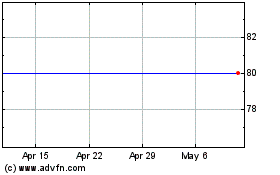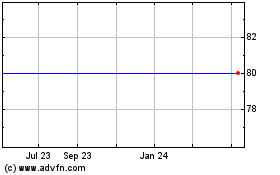Dell and CEO Return to Public Spotlight -- WSJ
July 03 2018 - 3:02AM
Dow Jones News
By Jay Greene
This article is being republished as part of our daily
reproduction of WSJ.com articles that also appeared in the U.S.
print edition of The Wall Street Journal (July 3, 2018).
When Dell Inc. closed the biggest technology merger in history
nearly two years ago, the company's namesake founder said the new
entity would enjoy its freedom away from the glare of Wall Street
and its obsession with quarterly earnings.
On Monday, Michael Dell said he was ready to go under the
spotlight again. "I did that for 25 years, and obviously I know
what I'm getting myself into," he said in an interview.
Mr. Dell's company, now known as Dell Technologies Inc., is a
one-stop shop for corporate-technology services that was formed
through the $67 billion merger between Dell and EMC Corp. On
Monday, it announced plans to buy the shares that track its stake
in the fast-growing software company VMware Inc. -- a move that
would make Dell a publicly traded company once again.
The share-swap decision came after a monthslong strategic review
as Dell wrestled with a bulging debt load built through a $25
billion leveraged buyout in 2013 that took the company private and
the EMC deal, which added tens of billions of dollars more to the
pile.
Dell Technologies had been paying roughly $2 billion a year in
interest on that debt when Congress passed legislation at the end
of 2017 that eliminated a big chunk of the deductions companies can
make on such payments. Wall Street questioned the law's impact on
heavily indebted companies.
There is "no doubt" the tax change pushed Dell to look for
"creative ways to reduce its debt load and likely simplify its
capital structure," said Brad Reback, an analyst with Stifel
Nicolaus & Co.
But Mr. Dell pushed back on the notion the change in U.S. tax
law had anything to do with the company's decision to be publicly
traded again. "The change in the tax law was not any material
change to the financial condition of the company," Mr. Dell
said.
Mr. Dell and the company declined to comment further on the tax
impact.
Dell has performed well in a strong tech market, with its
products business growing 22% to $16.67 billion in the quarter that
ended May 4, driving 19% overall net revenue growth to $21.36
billion.
But Dell's return to a public company comes as corporate
computing is evolving. In the five years Dell was privately held,
cloud computing has soared, diminishing legacy companies that sell
hardware -- Dell's key businesses as a maker of servers and storage
gear.
Corporate customers are increasingly renting computing services
from Amazon.com Inc., rather than buying their own hardware.
"The shift is toward public cloud, which is not in Dell's
favor," said Craig Lowery, an analyst with the market-research firm
Gartner Inc. "There may not be as good a time next year to do
this."
Mr. Dell said his company's server business grew 41% last
quarter, an indication of the strength of the market serving
companies that operate their own technology. "It's not all going to
the public cloud, but we've known that for a long time," Mr. Dell
said.
By simplifying its ownership structure, the move creates
"strategic flexibility," Mr. Dell said. The company has sought to
diversify its business lines in recent years, pushing into flashier
areas of tech such as the so-called Internet of Things, where it
committed a $1 billion investment.
Write to Jay Greene at Jay.Greene@wsj.com
(END) Dow Jones Newswires
July 03, 2018 02:47 ET (06:47 GMT)
Copyright (c) 2018 Dow Jones & Company, Inc.
Dell Technologies Inc. (NYSE:DVMT)
Historical Stock Chart
From Jun 2024 to Jul 2024

Dell Technologies Inc. (NYSE:DVMT)
Historical Stock Chart
From Jul 2023 to Jul 2024
